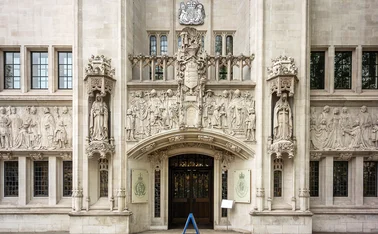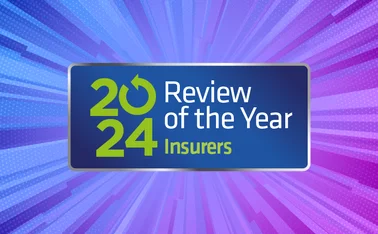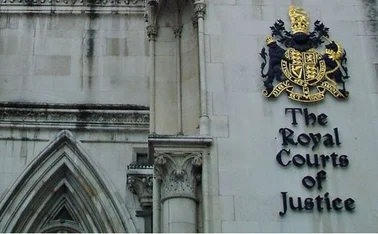
Orient Express: What if the Supreme Court goes against precedent in the FCA BI test case?

During the High Court hearing of the Financial Conduct Authority’s business interruption test case, the regulator argued that reversing the judgment in the historic Orient Express case would “restore sanity”. If the Supreme Court chooses to overrule the case's precedent then the consequences for insurers could be far-reaching.
During the course of High Court proceedings, the regulator’s lawyers argued that going against the approach set down in Orient Express Hotels v Assicurazioni Generali, a claim involving a hotel caught up in hurricane damage (see box), would restore policies to “acting in a way an insured would expect them to operate”.
Ultimately Lord Justice Flaux and Mr Justice Butcher found that the ruling in Orient Express had misinterpreted the peril, seen as a victory for policyholders.
The FCA’s BI test case has moved on to the appeal stage, with five Supreme Court judges expected to rule on a number of elements of appeal either this year or in January.
According to Sarah Prager, barrister at One Chancery Lane chambers, the High Court was critical of the Orient express decision, and described it in “unflattering terms and not being relied on very often and as being the subject of criticism”.
She said: “They don’t appear to have regarded it as being fully accepted law.
“If the Supreme Court agrees, and overturns it, there will be a significant shift in the law in relation to BI claims arising out of events which lead to generalised disruption. Insurers could potentially find themselves insuring against risks they did not think they would be insuring against, including but not limited to Covid-19, and this will have obvious knock-on effects.”
Orient Express Hotels v Assicurazioni Generali
The case refers to a hotel that was closed for two months in 2005 after suffering damage from Hurricane Katrina. The insurer in the case, Generali, argued that applying a ‘but for’ test the hotel would have suffered from BI whether it was damaged or not, as the surrounding area was also devastated by the hurricane.
In Orient Express the judge upheld a tribunal’s decision on the concurrent causes, which found that ‘but for’ reasoning meant the hotel was entitled to significantly less of a pay out under its BI policy due to a trends clause in the policy.
Roger Franklin, Edwin Coe head of insurance litigation, said: “The clever argument that was made in Orient Express was that although the hotel had suffered hurricane damage, even if it’s the correct counterfactual, [it was not accurate] to imagine what would have happened had it not have suffered hurricane damage in a New Orleans that was perfectly open and available to everyone going there on holiday.
“The reality was, New Orleans had been flattened, and nobody was going there. [The judge] said that you couldn’t imagine an open hotel in a perfectly functioning New Orleans, you had to imagine an undamaged hotel in the circumstances of New Orleans at the time. That meant that they’d suffered very little loss because nobody was going there and a lot of it was to do with the ‘but for’ test.
“So what would have happened? What would have been the position ‘but for’ the damage suffered by the hotel? And then you get the hypothetical scenario that seems slightly counterintuitive, because if you’ve got hurricane damage, one would have thought that would take into account in your business interruption losses, the presence of a hurricane. But in fact, it didn’t in in Orient Express.”
He added that Orient Express argument reduces insurers exposure “significantly” where there is wide area damage.
Increased liability
Prager added that Orient Express is “one of the most interesting parts” of the FCA test case appeal, because “important as the Covid-19 cases are, the points of general contractual construction will apply to all contracts for insurance, and as such are yet more important.”
Ed Lewis, partner at Weightmans, said that while Orient Express is not the subject of the appeal of the test case, the Supreme Court may “establish new law in terms of the appropriate test for causation and what was used as the test for causation in Orient Express will be set aside”.
He continued: “If [the Supreme Court] does that, it won’t be just relevant to BI insurance, it will be relevant to all insurance, all liability insurance and first party insurance as well.”
He added that this would also apply to “any situation where you need to apply causation test for liability, irrespective of if there is an insurance cover or not”.
“The potential reach of the judgement is huge,” Lewis said.
As a result of the “significant impact” the Supreme Court verdict could have, Lewis said the judges would not want to “go as far as to tear up the entire legal rulebook on causation and say ‘we’re starting over, there’s a different approach’.”
‘But for’ test
The law requires the application of a two stage test when looking at whether insurance policies should pay out.
Talking point
Two of the five judges on the Supreme Court BI test case panel oversaw rulings on Orient Express.
Lord Leggatt was part of a 2009 tribunal, while Lord Hamblen dismissed Orient Express’s appeal against an arbitration award in 2010.
Aaron Le Marquer, partner at Fenchurch Law said this is “of great interest”.
He noted: “It should not however be assumed that either of these two judges will automatically side with insurers on the issue. The original Orient Express decision was made in the very constrained context of an arbitral award appeal, meaning that the court had to consider whether the tribunal had made an error of law in its decision.
“The court did not consider the arguments of the parties de novo, and it is clear from the judgment that certain arguments that could have been raised by the policyholder in the arbitral proceedings were not, and could not therefore be considered by the Court.
“Ten years on, the Covid-19 pandemic has not only presented very different factual circumstances under which the issue has fallen for consideration, but full and detailed legal arguments have been thoroughly ventilated by both sides.
“It is quite possible that either Lord Legatt and/or Lord Hamblen may reach a different conclusion based on the case presented to them. Beyond that, there is of course a panel of five justices who may reach a majority decision in favour of the FCA, even if Lords Hamblen and Leggatt remain persuaded by the insurers’ case.”
.
Lewis explained: “There are two types of causation. There’s factual causation and there’s legal causation. Those are often referred to as ‘but for’ causation and proximate causation.
“When you apply ‘but for’ causation, before you get into the law at all, what you have to ask yourself is ‘was the cause a factual cause of the loss’ and if the answer is ‘no it wouldn’t’, then the factual causation is demonstrated by the ‘but for’ test. If the loss would have happened without the cause, then the factual test isn’t satisfied, so you don’t even get to legal causation. Fundamentally if something factually wouldn’t have caused the loss, there’s no point in looking at it in a narrow legal context because it can’t have been. One has to follow the other.”
Lewis argued: “I don’t think we’ll end up with a situation where the Supreme Court says ‘but for’ causation is no longer relevant. It really is.”
Alistair Kinley, director of policy and government affairs at BLM, agreed that overturning or “setting aside” Orient Express, would mean that “the BI Indemnity would be greater than if Orient Express applies”.
He explained: “This is because the hypothetical trading of the insured - ie ‘but for’ the inability to operate - would be calculated by stripping away not just the specific closure of the business but also the general wider restrictions. The more that’s stripped away in the so-called ‘counterfactual’, the more the BI indemnity increases.”
Inadequate cover
Fenchurch Law partner Aaron Le Marquer said that while the court’s findings on which policies are triggered by the Covid-19 pandemic are “of immediate importance” to policyholders seeking compensation for their losses, “many of those findings are likely to be confined to the present unique facts”.
He continued: “The findings in relation to the Orient Express case and causation more generally are much more far-reaching. As it currently stands, the [High Court] has distinguished Orient Express but indicated that it thought it was wrongly decided. If the Supreme Court agrees, it will produce a much fairer and commercially functional outcome for policyholders in future BI claims.
“Taking the example of the hurricane-damage hotel in the Orient Express case, it would mean that the policyholder would be covered for the full extent of their loss of profits suffered whilst the hotel was closed following damage caused by hurricane, which is surely what the policyholder would have expected when they took out the policy.”
Le Marquer continued: “Having purchased cover for direct property damage caused by hurricanes, and for consequential loss in the form of business interruption loss flowing from such damage, it is very difficult for a policyholder to be told that they are not covered for the business interruption loss, because that was caused by the hurricane, not by the damage. The policyholder will almost certainly have understood that they purchased cover for BI losses caused by hurricanes (provided that their own property was damaged.)”
Le Marquer added that the finding in Orient Express results “partly from the specific way in which BI coverage drafting has evolved, specifying cover for losses caused by ‘damage’, rather than by a peril otherwise insured under the policy.”
He added: “But such a narrow form of cover is of little use to policyholders when it leaves them with less cover, not more, in the event of a more severe catastrophe, and whilst there is some legal logic to the decision reached in that case (but also some significant problems), the result is commercially unviable.
“If the Orient Express decision is upheld, that may lead to a conclusion that the industry is simply not providing adequate insurance coverage for catastrophic and systemic risks faced by policyholders. Underwriting and pricing practices may need to be revisited, certainly, but simply refusing to provide the cover required is not an acceptable position for the traditional insurance industry to take, and will hasten the shift towards alternative risk transfer products.”
Two concurrent causes - the significance of Orient Express
Ed Lewis, partner at Weightmans, said that the law has been very good at addressing the situation where causes combine to cause a loss, or interdependent concurrent losses, so one or the other on its own doesn’t trigger loss.
He explained: “Both of the causes have to happen together in order for the loss to arise.
“What the court have always said is that when one of those losses is excluded by an insurance policy, then the insurance can’t be held liable for something they never agreed to be liable for.”
He said while there is a clarity around interdependent clauses, “we struggle on independent concurrent causes”.
He added: “where two things happen very close to one another in time, but either one on its own could cause loss, what do you do then if an insurer turns around and says ‘I only agreed to insure one of these but not the other’?”
He pointed out that Orient Express is one of the few cases that has dealt with the situation where a loss is caused by “two concurrent causes, side by side”.
He continued: “The criticism [of Orient Express] is that the tribunal artificially created two concurrent causes, there was only one cause, and that was the hurricane damage. But the tribunal said there’s two – there’s damage to the hotel and then there’s a wider area damage.
“What we really need is a decision that definitely explain what you do in an insurance context when you have independent concurrent causes. Does the insurer escape liability or no? There’s been a number of cases that have come close to addressing this […] but Orient Express is the only case that’s really ever come close to addressing what you do in that situation. But it’s squarely on all fours with what we’re dealing with.
“What we’re dealing with now is a situation where for the first time, the Supreme Court has a chance to explain, what do you do with concurrent independent causes in an insurance context?”
Only users who have a paid subscription or are part of a corporate subscription are able to print or copy content.
To access these options, along with all other subscription benefits, please contact info@postonline.co.uk or view our subscription options here: http://subscriptions.postonline.co.uk/subscribe
You are currently unable to print this content. Please contact info@postonline.co.uk to find out more.
You are currently unable to copy this content. Please contact info@postonline.co.uk to find out more.
Copyright Infopro Digital Limited. All rights reserved.
As outlined in our terms and conditions, https://www.infopro-digital.com/terms-and-conditions/subscriptions/ (point 2.4), printing is limited to a single copy.
If you would like to purchase additional rights please email info@postonline.co.uk
Copyright Infopro Digital Limited. All rights reserved.
You may share this content using our article tools. As outlined in our terms and conditions, https://www.infopro-digital.com/terms-and-conditions/subscriptions/ (clause 2.4), an Authorised User may only make one copy of the materials for their own personal use. You must also comply with the restrictions in clause 2.5.
If you would like to purchase additional rights please email info@postonline.co.uk








